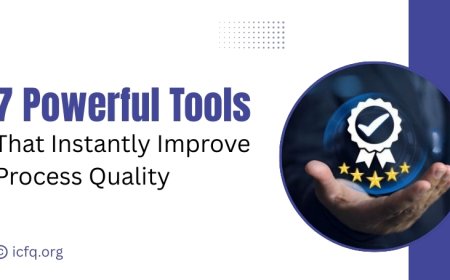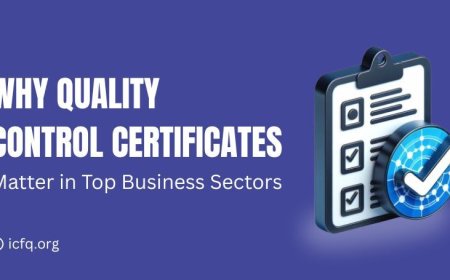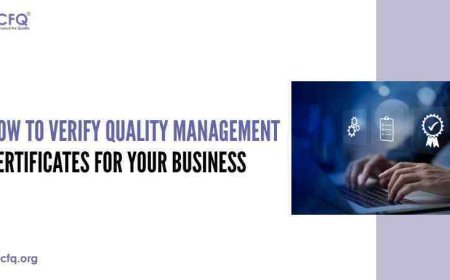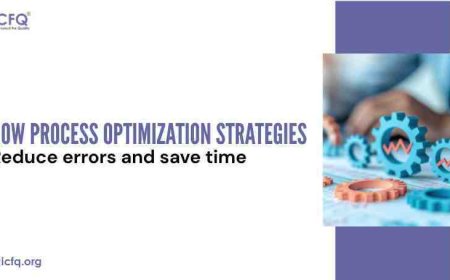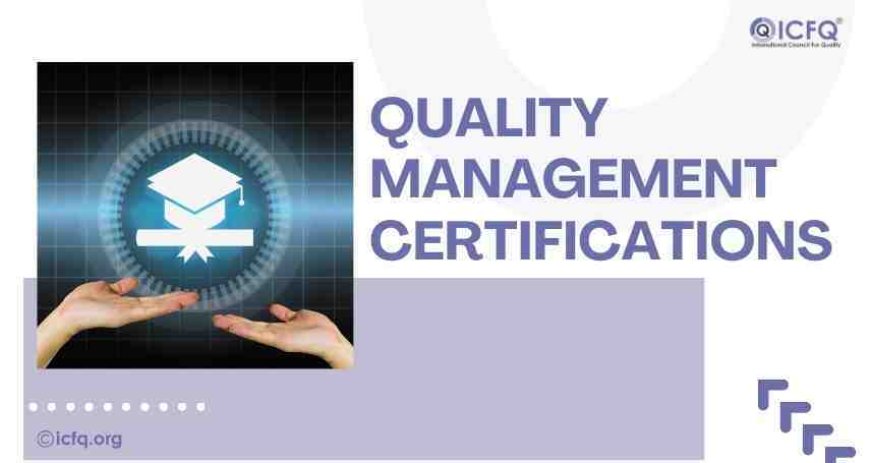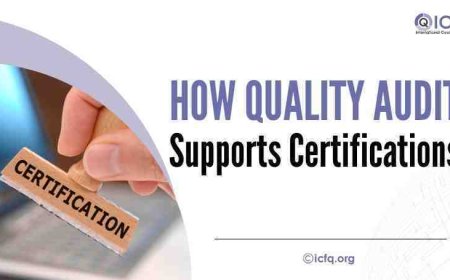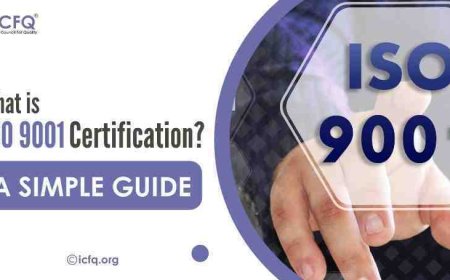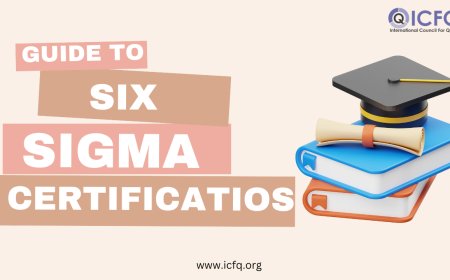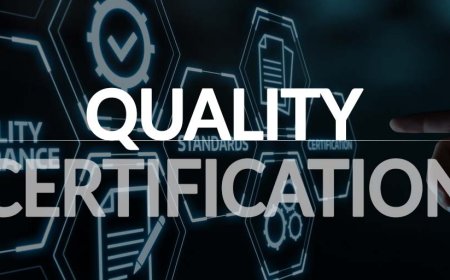Quality management certifications are credentials awarded to individuals or organizations that demonstrate proficiency in various aspects of quality management systems, processes, and methodologies. These certifications signify a commitment to quality improvement, adherence to industry standards, and competency in implementing quality management principles. Quality management certifications offer professionals a structured pathway to develop expertise and demonstrate mastery in ensuring quality standards. Whether you're a seasoned quality professional or just starting your career in quality management, understanding the landscape of certifications available can be instrumental in advancing your career and contributing to organizational excellence.
Some of the most widely recognized quality management certifications include
-
ISO 9001 Certification: ISO 9001 is the international standard for quality management systems (QMS). Achieving ISO 9001 certification demonstrates an organization's ability to consistently provide products and services that meet customer and regulatory requirements.
-
Six Sigma Certification: Six Sigma is a data-driven methodology for process improvement aimed at reducing defects and variation. Certifications are available at various levels, such as Yellow Belt, Green Belt, Black Belt, and Master Black Belt, indicating different levels of proficiency in Six Sigma methodologies.
-
Certified Quality Engineer (CQE): the CQE certification is designed for individuals who demonstrate proficiency in understanding and applying principles of quality engineering and quality management.
-
Certified Manager of Quality/Organizational Excellence (CMQ/OE): the CMQ/OE certification is for individuals who lead and manage quality initiatives within an organization, focusing on strategic and organizational-level quality management.
-
Lean Certification: Lean principles focus on reducing waste and increasing efficiency in processes. Various organizations offer Lean certifications, such as Lean Six Sigma certifications, which combine Lean and Six Sigma methodologies.
-
Certified Quality Auditor (CQA): the CQA certification is for individuals who demonstrate competence in auditing quality management systems, processes, and products to ensure compliance with standards and regulations.
Benefits of quality management certifications
Quality management certifications offer numerous benefits to both individuals and organizations, including:
Enhanced Skills and Knowledge: Certifications provide comprehensive training in quality management principles, methodologies, and tools, enhancing individuals' capabilities to drive quality improvement.
Increased Credibility and Recognition: Certified professionals gain industry-recognized validation of their expertise, leading to greater trust and respect from colleagues, clients, and employers.
Career Advancement Opportunities: Holding certifications opens doors to new career opportunities and advancement within organizations seeking skilled quality management professionals.
Global Recognition: Many certifications, such as ISO 9001 and Six Sigma, are internationally recognized, showcasing proficiency in global best practices and enhancing career prospects globally.
Improved Organizational Performance: Certified professionals contribute to improved product and service quality, increased customer satisfaction, and greater organizational competitiveness through effective quality management practices.
Risk Mitigation: Certifications help mitigate risks associated with quality issues, product defects, and non-compliance, enabling organizations to proactively address challenges and maintain operational excellence.
Promotion of Continuous Improvement Culture: Certifications foster a culture of continuous improvement, equipping professionals with tools to identify inefficiencies, drive innovation, and promote excellence throughout the organization.
Role of Certification in Quality Management
Certification plays a crucial role in Quality Management by providing standardized benchmarks for individuals and organizations to demonstrate their proficiency and commitment to quality improvement. Here are some key roles that certification serves in Quality Management
Recognition of Expertise: Quality management certifications, such as those in Lean Six Sigma or ISO standards, recognize individuals who have acquired the necessary knowledge and skills to drive quality improvements effectively. These certifications validate their expertise and demonstrate their ability to implement quality management practices.
Enhanced Credibility: Organizations with certified professionals have enhanced credibility in the eyes of customers, stakeholders, and regulatory bodies. Certification serves as evidence of the organization's commitment to maintaining high-quality standards and continuous improvement.
Standardization of Practices: Certification programs establish standardized practices and methodologies for quality management, ensuring consistency and uniformity in implementation across industries and organizations. This facilitates interoperability and enables organizations to benchmark their performance against industry best practices.
Competitive Advantage: Certified individuals and organizations gain a competitive advantage in the marketplace. Certification demonstrates a commitment to quality excellence, which can differentiate them from competitors and attract customers who prioritize quality and reliability.
Risk Mitigation: Certification programs often include rigorous training on risk management and compliance with quality standards and regulations. By adhering to certified practices, organizations can mitigate risks associated with quality failures, product recalls, and non-compliance issues.
Continuous Improvement Culture: Certification fosters a culture of continuous improvement within organizations by promoting the adoption of proven quality management methodologies and tools. Certified professionals are equipped with the knowledge and skills to identify areas for improvement, implement corrective actions, and drive ongoing quality enhancements.
Global Recognition: Many quality management certifications, such as ISO 9001, are internationally recognized and accepted. This enables organizations to demonstrate their commitment to quality on a global scale and facilitates international trade and collaboration.
levels of lean Six Sigma certification
Lean Six Sigma certifications typically span multiple levels, including Yellow Belt, Green Belt, Black Belt, and Master Black Belt. Yellow Belt certification signifies a basic understanding of Lean Six Sigma concepts, while Green Belts possess a deeper knowledge and lead smaller improvement projects. Black Belts demonstrate mastery of methodologies, leading larger-scale projects, and mentoring Green Belts. Master Black Belts, the highest level, provides strategic guidance, and mentorship, and drives organizational-wide initiatives. These certifications denote increasing expertise in Lean Six Sigma methodologies, empowering professionals to contribute effectively to process improvement and organizational success.
Lean Six Sigma Yellow Belt certification
Overview of Lean Six Sigma: Understanding the history, origins, and key principles of Lean Six Sigma, including its focus on reducing waste, improving efficiency, and enhancing quality.
DMAIC Methodology: Introduction to the DMAIC (Define, Measure, Analyze, Improve, Control) framework, which serves as the structured approach for process improvement projects within Lean Six Sigma.
Roles and Responsibilities: Clarification of the roles and responsibilities of different team members within Lean Six Sigma projects, including Yellow Belts, Green Belts, Black Belts, and Champions.
Basic Tools and Techniques: Familiarization with basic Lean Six Sigma tools and techniques, such as process mapping, fishbone diagrams (Ishikawa diagrams), root cause analysis, and basic statistical analysis.
Project Participation: Yellow Belts are typically trained to participate as team members in improvement projects led by Green Belts or Black Belts, contributing to data collection, analysis, and implementation activities.
Problem-Solving Skills: Development of problem-solving skills essential for identifying opportunities for improvement, defining project scopes, and supporting the implementation of solutions.
Certification Exam: Completion of a certification exam assessing the understanding of Lean Six Sigma concepts and principles covered in the training program. The exam may include multiple-choice questions, scenarios, or practical exercises.
Lean Six Sigma Green Belt certification
Advanced DMAIC Methodology: In-depth training on the DMAIC (Define, Measure, Analyze, Improve, Control) framework, including advanced tools and techniques for each phase, such as hypothesis testing, regression analysis, and design of experiments (DOE).
Project Leadership: Developing skills to lead and manage improvement projects independently, including project planning, stakeholder management, and team facilitation.
Statistical Analysis: Mastery of statistical analysis techniques essential for data-driven decision-making, including probability distributions, hypothesis testing, correlation analysis, and regression analysis.
Process Improvement Tools: Comprehensive understanding and application of a wide range of Lean Six Sigma tools and techniques, including process mapping, value stream mapping, failure mode and effects analysis (FMEA), and control charts.
Change Management: Understanding the principles of change management and how to effectively implement and sustain process improvements within organizational contexts.
Certification Project: Completion of a Green Belt certification project, where participants apply their knowledge and skills to identify, analyze, and implement process improvements within their work areas or departments.
Certification Exam: Successful completion of a certification exam, which assesses the understanding of Lean Six Sigma concepts, methodologies, and tools covered in the training program.
lean six sigma black Belt certification
A Lean Six Sigma Black Belt certification is the highest level of training and expertise within the Lean Six Sigma methodology. It equips individuals with advanced skills to lead and manage complex improvement projects and drive significant organizational change. Here are the comprehensive details typically covered in a Black Belt certification program:
Advanced DMAIC Mastery: Extensive training in the DMAIC (Define, Measure, Analyze, Improve, Control) methodology, focusing on advanced techniques for each phase, including multivariate analysis, advanced regression analysis, and optimization methods.
Project Leadership and Management: Advanced project management skills, including project planning, execution, risk management, and stakeholder communication. Black Belts are expected to lead cross-functional teams and manage large-scale improvement initiatives.
Advanced Statistical Analysis: Mastery of advanced statistical tools and techniques, including hypothesis testing for multiple variables, design of experiments (DOE) for optimization, statistical process control (SPC), and non-linear regression analysis.
Change Management and Organizational Leadership: In-depth understanding of change management principles and strategies to effectively drive and sustain organizational change. Black Belts are trained to influence organizational culture and lead transformational initiatives.
Advanced Lean Tools and Techniques: Advanced knowledge and application of Lean tools and techniques, such as value stream mapping, kaizen events, mistake-proofing (poka-yoke), and total productive maintenance (TPM).
Coaching and Mentoring: Black Belts are prepared to mentor and coach Green Belts and other team members, guiding project execution, data analysis, and problem-solving methodologies.
Certification Project: Completion of a Black Belt certification project, which involves identifying, analyzing, and implementing significant process improvements or redesigns within the organization. Projects are typically high-impact and aligned with strategic objectives.
Certification Exam: Successful completion of a comprehensive certification exam, covering advanced Lean Six Sigma concepts, methodologies, tools, and their practical application in real-world scenarios.
Choosing the Right Certification
Choosing the right Lean Six Sigma certification depends on your career goals, current skills, and the level of expertise you want to achieve. Here's a brief guide to help you make the decision
Yellow Belt: Opt for this certification if you're new to Lean Six Sigma and want a basic understanding of the methodology. It's suitable for employees who will participate in improvement projects as team members but may not lead them.
Green Belt: Choose this certification if you want to take on a leadership role in improvement projects within your organization. It provides a deeper understanding of Lean Six Sigma principles and equips you to lead smaller to medium-sized projects.
Black Belt: If you aim to become a Lean Six Sigma expert and lead complex improvement projects across departments or organizations, this certification is the right choice. Black Belts are highly skilled professionals capable of driving significant organizational change and delivering substantial business results.
Master Black Belt: Consider pursuing this certification if you aspire to become a strategic leader in Lean Six Sigma implementation within your organization or consult across multiple organizations. Master Black Belts provides mentorship, guidance, and leadership in Lean Six Sigma initiatives.
Preparation and Examination
Preparing for a Lean Six Sigma certification exam requires a combination of studying course materials, practising with sample questions, and gaining hands-on experience in applying Lean Six Sigma methodologies. Here's a step-by-step guide to help you prepare effectively:
-
Select the Right Study Materials: Choose study materials that align with the certification level you're pursuing. This may include textbooks, online courses, practice exams, and reference guides provided by reputable Lean Six Sigma training providers.
-
Understand the Exam Content: Review the exam syllabus or content outline provided by the certifying body to understand the topics covered and their relative weightage in the exam. Focus your preparation on these areas.
-
Study Methodically: Break down the study material into manageable sections and create a study schedule. Dedicate regular time each day or week to study, ensuring consistent progress leading up to the exam.
-
Practice with Sample Questions: Practice answering sample questions or taking mock exams to familiarize yourself with the format and structure of the actual exam. This will also help you gauge your readiness and identify areas for further study.
-
Apply Lean Six Sigma Concepts: Gain practical experience by participating in improvement projects within your organization or seeking opportunities to apply Lean Six Sigma methodologies to real-world scenarios. This hands-on experience will reinforce your understanding of the concepts and principles.
-
Seek Clarification: If you encounter any concepts or topics that are unclear during your study, don't hesitate to seek clarification from instructors, peers, or online forums specializing in Lean Six Sigma.
-
Review and Reinforce: Review your study materials regularly and reinforce your learning through repetition and practice. Use flashcards, mind maps, or other mnemonic devices to help retain key concepts and formulas.
-
Stay Calm and Confident: On the day of the exam, ensure you're well-rested and mentally prepared. Stay calm and confident during the exam, and carefully read each question before selecting your answers. Manage your time effectively to complete all sections of the exam within the allotted timeframe.
By following these preparation steps and dedicating sufficient time and effort to your studies, you'll be well-equipped to pass your Lean Six Sigma certification exam and demonstrate your proficiency in Lean Six Sigma methodologies.
quality management certifications play a vital role in ensuring organizations and individuals uphold standards of excellence, efficiency, and customer satisfaction. These certifications, ranging from ISO standards to Lean Six Sigma levels, offer structured pathways for professionals to enhance their skills, credibility, and career prospects. By obtaining certifications, individuals demonstrate their proficiency in implementing quality management principles and driving continuous improvement initiatives, ultimately contributing to organizational success and competitiveness in today's dynamic business environment. With comprehensive training, practical experience, and diligent preparation, aspiring quality professionals can successfully achieve their certification goals and make meaningful contributions to the advancement of quality management practices.










